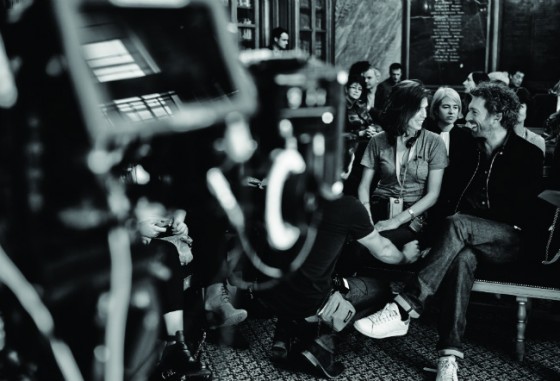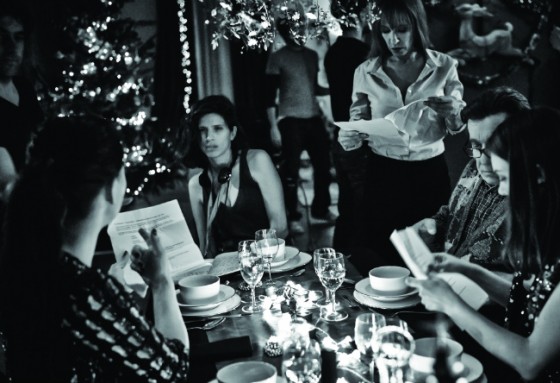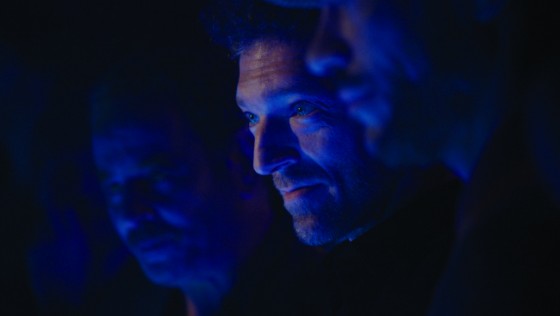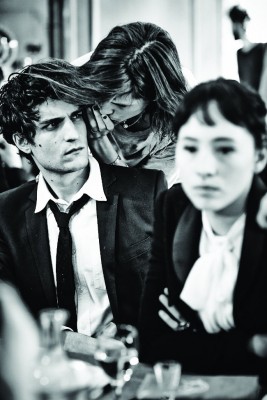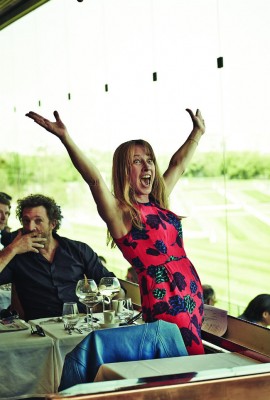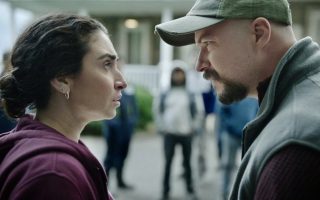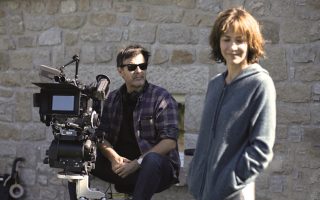An Exclusive Interview with Film Director Maïwenn
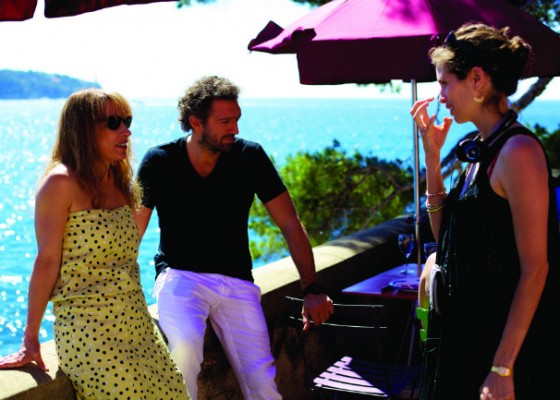
She has played a snaky-tressed futuristic diva, a wide-eyed teen stalked by a horrific killer, a tough-as-nails investigating photographer from the French Ministry of the Interior, and was handpicked by Karl Lagerfeld to model for Chanel. At 40, French actress-turned-director Maïwenn continues to surprise audiences with her impressive versatility and an unconventional ‘tell it like it is’ attitude, both on and off screen.
“On a set, when a woman is demanding, people tend to say, ‘She’s a pain in the butt’,” says Maïwenn, who is curled up on a white leather sofa on the rooftop terrace of a Cannes hotel. “But when a man does it, he’s just ‘demanding’.”
And she has been around directors long enough to know. First discovered as a child actress and then known as the former wife of filmmaker Luc Besson, Maïwenn (who in recent years dropped her last name, Le Besco), is hardly a newcomer to the film industry. Thrown into the cinema world at an early age (she alludes to her overzealous stage mother), Maïwenn landed a role when she was only seven in Jean Becker’s 1983 drama l’Été meurtrier (One Deadly Summer), starring Isabelle Adjani. By the time the actress appeared in the 2003 thriller Haute Tension(High Tension), directed by horror flick master Alexandre Aja, Maïwenn had already started to rethink her career and was determined to direct her own films. Her feature debut, a biting drama about a dysfunctional family entitled Pardonnez-Moi(Forgive Me), was released in 2006.
International Limelight
But when Maïwenn’s third film, Polisse, a surprise hit social drama, was awarded the prestigious Jury Prize at the 2011 Cannes Film Festival, she found herself catapulted into an international limelight.
“It didn’t really change my vision about movie-making, but it did have an enormous impact in my daily life. Because of the film’s huge popular success, it actually helped me to get tables in all the good restaurants,” she says with a smile. “But the downside of it was being recognized everywhere. I’m used to sitting on a café terrace where I can watch everyone passing by. All of a sudden, people were stopping and taking photos. My friends told me I’d have to change my daily routines but I refused,” she adds with a shrug. “I mean, merde, I wasn’t going to go into hiding!”
Now, four years later, Maïwenn’s newest film, Mon Roi, is a vertiginous, emotional and ultra-romantic drama starring Emmanuelle Bercot (who scooped up Cannes’ 2015 prize for Best Actress for her heartbreaking performance) and Vincent Cassel. An elegantly shot modern love story, the film spans ten years of flashbacks, beginning with the heroine’s desperate, near-suicidal attempt to extricate herself from a painful impasse.
In the opening scene of the film, we see Tony (Bercot), a 40-something lawyer, about to descend a steep, dangerously icy slope on her skis. Her expression is a mix of steely determination and trepidation, as if she already knows that her reckless action is bound to have consequences. And it does: the damage to her knee in the accident is so extensive that she is obliged to retreat to a convalescence centre, where she muses on her long, tumultuous relationship with Giorgio (brilliantly portrayed by Cassel), her flamboyant restaurateur husband.
The story loops back to when Tony meets Giorgio one night at a club. At the outset, he’s irresistible: witty, gregarious, wealthy – plus he has a huge, luxurious apartment and is surrounded by glamorous friends in the fashion world. He’s also an egotist, manically impulsive, a drug user, a spendthrift and a womanizer. But of course, she doesn’t know that yet. After a heady courtship, they get married and Tony soon gets pregnant. However, only Tony’s brother, Solal (played by Louis Garrel) is suspicious of Giorgio, and his intuitions are eventually proven to be well-founded, as Tony and Giorgio plummet from passion into marital hell.
It Was Only A Love Story…
“I worked on Mon Roi for ten years, on and off. At first, it was only a love story,” explains Maïwenn. “About two years ago, I decided that it would be interesting to bring in Tony’s accident and have the female character deal with the reconstruction of her body. I wanted give the character some distance on her own story and the man who destroyed her.”
The lead role was written expressly for Emmanuelle Bercot, who appeared in Polisse and is also a director and scriptwriter, and co-wrote the screenplay. “For Vincent, I’ve wanted to work with him for quite some time, but none of my other films had a suitable role. He is very straightforward, focused and totally without pretension,” says Maïwenn.
When it comes to talking shop, Maïwenn tends to be succinct, dismissing any notions of aesthetics or lofty film-making theories.
“I wanted to talk about love,” she explains. “It’s as simple as that. When I direct, I don’t really do much. Basically, I transmit the idea that they can be themselves, and let them tell the story.”
But the word ‘improvisation’ will also make the director bristle. “For me, directing always depends on the actor’s capacity to dive into the story and let go of their emotions,” she says. “Improvisation is an overused word, especially when it concerns my work. I tend to feel that people disregard the rest, just because I favour improvisation in my films.
“What I’m after is making the scene sound like ‘the first time’ when they speak,” she continues. “There’s got to be some kind of truth in the moment. It doesn’t matter if it’s improvisation or if it has been written in a script, just as long as it happens.”
“The real challenge was to give Maïwenn the level of emotions that she expects,” concurs Emmanuelle Bercot. “If we didn’t, we had to repeat the scene, maybe a heated argument, take after take, until we got there. It was quite exhausting.”
“A couple is an impossible thing,” adds Vincent Cassel with a grin. “Mon Roi is really about the war of the sexes, and our incapacity to communicate after a certain time has gone by.”
Cassel says that he particularly appreciated Maïwenn’s willingness to allow the actor to offer insight into his character, which often meant defending Giorgio’s ostensibly despicable actions and make him seem a little “more realistic”.
“My job as an actor is to reveal the humanity of the character,” Cassel adds. “The great thing with Maïwenn is that she allows us to be part of the process. Her strength is that she’s not scared of anyone’s input because she never loses sight of what she has to say. I felt totally free to improvise. But then, of course, she cut everything the way she wanted it.”
Blunt Manner
By the same token, the director acknowledges that her blunt manner may seem aggressive to certain actors, but coddling is not her forté.
“It’s true that I don’t beat around the bush,” says Maïwenn. “When I’m not happy, I say it. But when I am happy, I laugh, I jump around, I smile, I scream. On set, I never take my eyes off the actors. If I stop looking at them, they’re puzzled, they’re quite upset!”
Ultimately Mon Roi offers a life lesson that could be summarized by a phrase that Giorgio says to Tony when we know that it’s already too late. “You knew who I was,” he tells her reproachfully.
“I think that there lies the real tragedy,” observes Bercot. “You leave people for the same reason you were attracted to them. It’s like the old saying, ‘she can’t live with him and she can’t live without him’. They still love each other, but they can’t be together. With distance, she eventually finds out how to go on.”
Stepping back from a project that has taken ten years to complete, what has Maïwenn learned from the experience of shooting Mon Roi?
“Afterwards, what’s important to me is not the success, but looking back on how I got there,” she says. “I find that my way of filming is now more reflective, more mature. Before I didn’t have any real knowledge about framing, or the technical side of things.”
She pauses, leans back into the sofa, takes a sip of water, then gazes directly at her interviewer. Her eyes are intensely blue, a disarming mix of cool and sparkle.
“I would compare my work to the feeling of falling in love. Each new film is different – you get butterflies in your stomach, you’re afraid, your head is spinning. But in the end, like love, it’s always worth it.”
From France Today magazine
Share to: Facebook Twitter LinkedIn Email
Leave a reply
Your email address will not be published. Required fields are marked *

